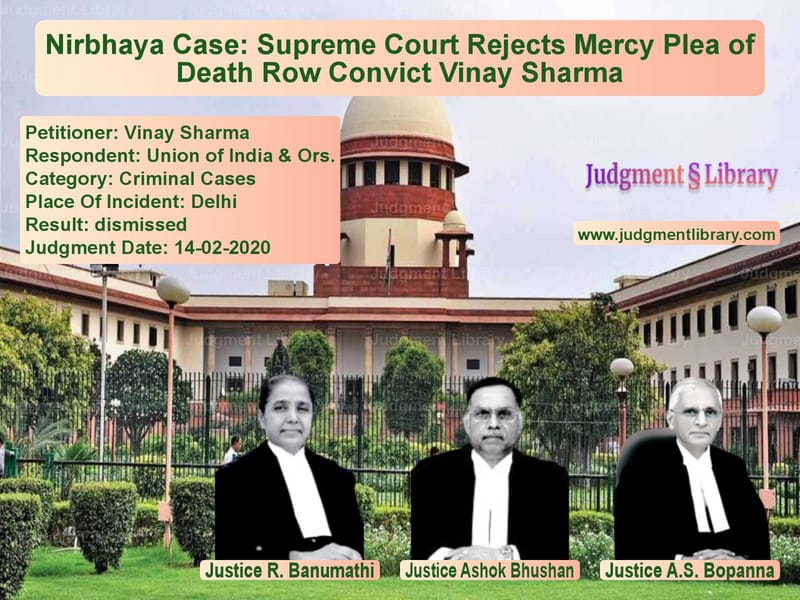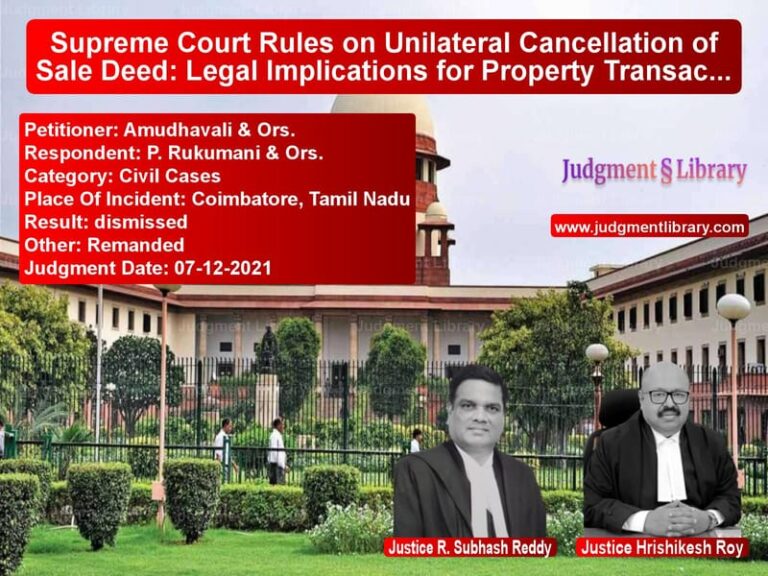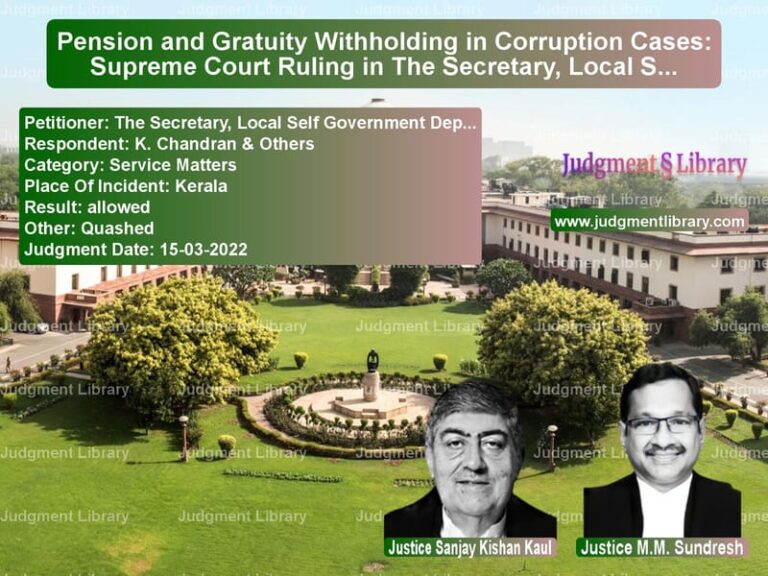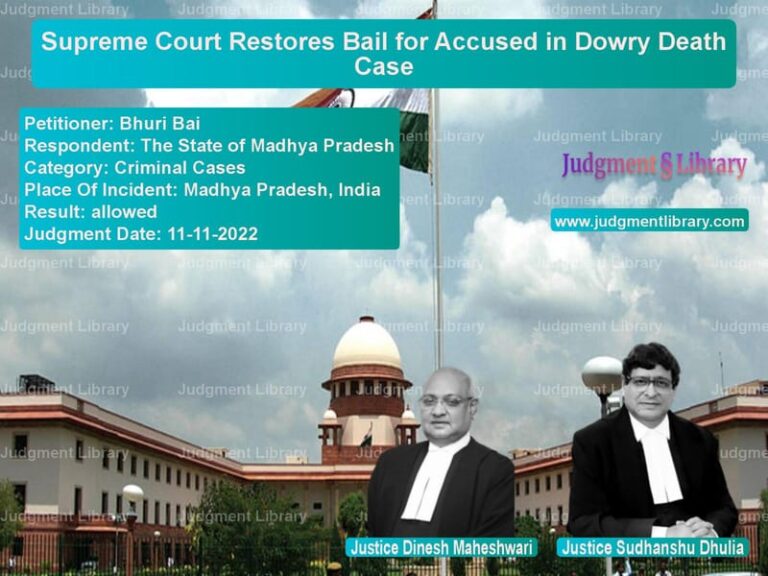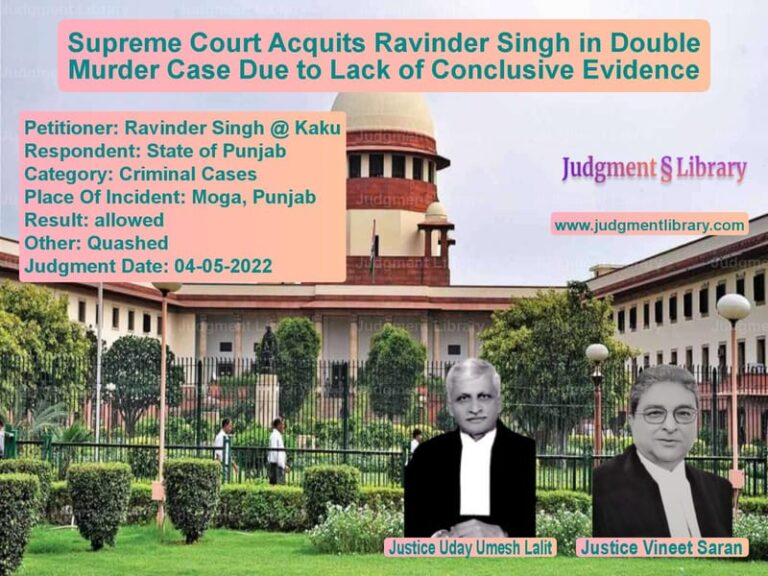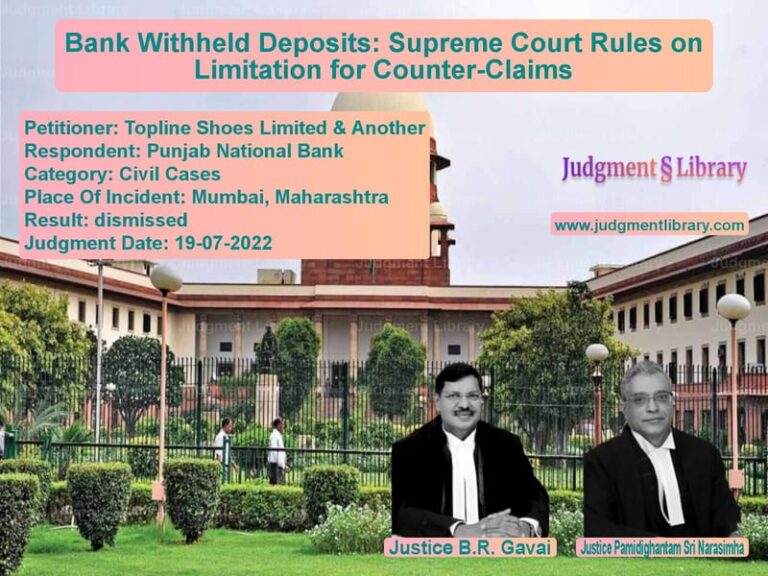Nirbhaya Case: Supreme Court Rejects Mercy Plea of Death Row Convict Vinay Sharma
The case of Vinay Sharma vs. Union of India & Ors. deals with the last legal attempt of a convict in the 2012 Nirbhaya gang rape and murder case to escape the death penalty. The Supreme Court dismissed the writ petition challenging the rejection of his mercy petition by the President of India. The Court upheld the validity of the rejection, affirming that there were no procedural lapses and that the convict had received due process at all levels of the justice system.
Background of the Case
Vinay Sharma, along with his co-accused, was convicted for his role in the brutal gang rape and murder of a 23-year-old woman in Delhi on the night of December 16-17, 2012. The trial court, High Court, and the Supreme Court had already upheld his death sentence, citing the crime as belonging to the “rarest of rare” category.
Sharma’s appeals and review petitions were repeatedly dismissed. His last legal resort was a mercy petition to the President of India under Article 72 of the Constitution. However, after the President rejected his plea, Sharma filed a writ petition before the Supreme Court, seeking a review of the rejection on several grounds.
Arguments of the Petitioner (Vinay Sharma)
- Sharma’s counsel argued that the rejection of the mercy petition was flawed due to non-consideration of relevant material.
- It was contended that he was subjected to torture and solitary confinement while in jail, which affected his mental health.
- The petitioner claimed that the relevant documents, including medical and social investigation reports, were not placed before the President for consideration.
- His counsel also alleged procedural irregularities in the rejection of his mercy plea, arguing that the Lieutenant Governor and the Home Minister of Delhi had not signed the recommendation for rejection.
- Sharma argued that as he was only 19 years old at the time of the crime, his young age should have been considered as a mitigating factor.
Arguments of the Respondent (Union of India)
- The Solicitor General, appearing for the government, submitted that all necessary documents, including medical reports and social investigation reports, were placed before the President.
- He argued that Sharma’s claims of torture and mental illness were baseless and that medical records confirmed he was in a stable mental condition.
- The government contended that there was no legal obligation to provide the petitioner with copies of all documents related to his mercy plea under the Right to Information Act.
- The prosecution maintained that Sharma’s case had already been reviewed multiple times, and there was no merit in further delaying the execution.
Supreme Court’s Judgment
A bench comprising Justice R. Banumathi, Justice Ashok Bhushan, and Justice A.S. Bopanna dismissed the writ petition, rejecting all arguments raised by Sharma’s counsel. The Court made the following key observations:
“The consideration of the mercy petition by the President of India was done following all legal procedures. There is no evidence to show that any relevant material was kept out of consideration.”
The Court further ruled that Sharma had been given a fair trial, and all his appeals had been duly considered and dismissed at multiple judicial levels.
“The petitioner’s argument regarding his young age at the time of the offense does not hold merit as the gravity of the crime far outweighs any mitigating factors.”
Regarding the allegations of torture and mental illness, the Court found that there was no medical evidence to support these claims:
“Medical records submitted to the President indicate that the petitioner is psychologically well-adjusted and stable. The claim of mental illness is unfounded.”
The Court also rejected the argument that the petitioner had been placed in solitary confinement, stating that he had only been kept in protective custody for security reasons.
Key Takeaways from the Judgment
- Judicial review of mercy petitions is limited: The Court reaffirmed that judicial intervention in clemency decisions is only possible in cases of gross procedural irregularities.
- Mental illness claims require solid proof: The judgment clarifies that mere claims of mental illness cannot be used as a ground to avoid execution unless medically established.
- Fair trial and due process: The ruling underscores that once a convict has exhausted all legal remedies, including multiple appeals and mercy petitions, further challenges will not be entertained.
- Age alone is not a mitigating factor: The Court reiterated that in cases of extreme brutality, youthfulness at the time of the crime does not automatically merit a lesser sentence.
Impact of the Judgment
This ruling reaffirms the finality of death penalty cases where all judicial and executive remedies have been exhausted. It sets a precedent for future mercy petition reviews, ensuring that procedural fairness is maintained while preventing unnecessary delays in executions.
The judgment also reinforces the need for transparency and due process in handling mercy petitions, clarifying that legal safeguards must be balanced against the interests of justice and the victims’ families.
Conclusion
The Supreme Court’s decision in Vinay Sharma vs. Union of India & Ors. upholds the rejection of the convict’s mercy plea and reinforces the principles of judicial finality in death penalty cases. By dismissing claims of procedural lapses and mental illness, the Court ensures that justice is served in the Nirbhaya case, marking a significant moment in India’s legal history.
Petitioner Name: Vinay Sharma.Respondent Name: Union of India & Ors..Judgment By: Justice R. Banumathi, Justice Ashok Bhushan, Justice A.S. Bopanna.Place Of Incident: Delhi.Judgment Date: 14-02-2020.
Don’t miss out on the full details! Download the complete judgment in PDF format below and gain valuable insights instantly!
Download Judgment: Vinay Sharma vs Union of India & Ors Supreme Court of India Judgment Dated 14-02-2020.pdf
Direct Downlaod Judgment: Direct downlaod this Judgment
See all petitions in Murder Cases
See all petitions in Bail and Anticipatory Bail
See all petitions in SC/ST Act Case
See all petitions in Judgment by R. Banumathi
See all petitions in Judgment by Ashok Bhushan
See all petitions in Judgment by A. S. Bopanna
See all petitions in dismissed
See all petitions in supreme court of India judgments February 2020
See all petitions in 2020 judgments
See all posts in Criminal Cases Category
See all allowed petitions in Criminal Cases Category
See all Dismissed petitions in Criminal Cases Category
See all partially allowed petitions in Criminal Cases Category

